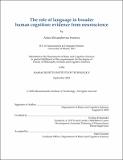The role of language in broader human cognition: evidence from neuroscience
Author(s)
Ivanova, Anna Alexandrovna
DownloadThesis PDF (10.57Mb)
Advisor
Fedorenko, Evelina
Terms of use
Metadata
Show full item recordAbstract
Many philosophers, psychologists, biologists, computer scientists, and linguists have argued that language processing serves as a foundation for human cognition. However, evidence from neuroscience has shown that language might rely on specialized cognitive mechanisms that are distinct from many aspects of human thought. In this thesis, I use cognitive neuroscience to test the limits of the brain’s functional specialization for language processing. In Chapter 1, I describe how evidence from neuroscience can illuminate the relationship between language and other cognitive functions. In Chapter 2, I investigate activity in the brain’s language network in response to computer code, an input that shares many structural similarities with natural language. I find that, despite these similarities, the language network responds weakly or not at all during computer code comprehension; instead, this process elicits responses in brain areas of a distinct, domain-general multiple demand network. In Chapter 3 and Chapter 4, I study the language network’s responses to pictures of objects and events during semantic tasks, which, like language comprehension, require access to conceptual information. I show that the language network does not respond during an object semantics task and that its responses to event semantics are not causally important for performing the task. In Chapter 5, I describe a set of brain regions that respond to semantic demand regardless of stimulus type (sentences vs. pictures) and show that they are distinct from both the language network and the domain-general multiple demand network. Finally, in Chapter 6, I discuss the implications of my work for a neuroscience-informed account of the mechanisms underlying human cognition and language use. My work establishes that language processing mechanisms are largely distinct from mechanisms that support the processing of non-linguistic structure and meaning, even for closely matched inputs, and helps further delineate the functional architecture of the human mind.
Date issued
2022-09Department
Massachusetts Institute of Technology. Department of Brain and Cognitive SciencesPublisher
Massachusetts Institute of Technology